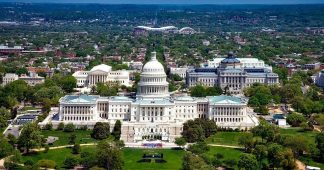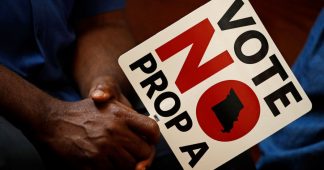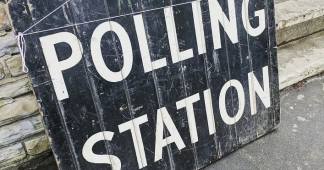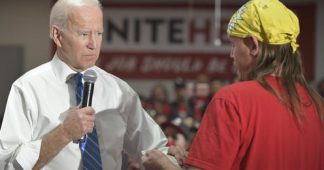To fight for historic worker rights legislation, major unions and the socialist left are joining forces like never before.
By
Apr. 12, 2021
For the first time ever, the Democratic Socialists of America (DSA) is joining forces with major unions on a national campaign. On March 7, DSA, the Communications Workers of America (CWA) and International Union of Painters and Associated Trades (IUPAT) launched an effort with an ambitious goal: getting Congress to pass the Protecting the Right to Organize (PRO) Act. If signed into law, the legislation would be the most significant labor rights bill since the New Deal era.
Over the past month, thousands of volunteers and organizers representing both DSA and the unions have made over 500,000 phone calls to voters in key legislators’ home states, asking voters to tell their representatives to support the PRO Act. This month, DSA and the unions plan on escalating the campaign with in-person rallies and town halls.
The collaboration offers something new to both sides, organizers told The Daily Poster. Though individual DSA chapters have worked with IUPAT and CWA locals before, walking picket lines and providing strike support, collaborating with unions on the national level offers the organization the credibility of labor groups that are major representatives of the working class, something that has so far proved elusive for the socialist group.
The unions, for their part, are able to access DSA’s passionate volunteer base. Both sides of the coalition told The Daily Poster that they hope that this campaign is just the beginning of a much closer working relationship between organized labor and the socialist left.
Coming Together
Though DSA is officially a staunch supporter of organized labor, relations between DSA and major unions have not always been smooth. In 2019, DSA activists were kicked out of a New York City CWA meeting, after being accused of plotting to infiltrate the union.
The mistrust may have come from DSA’s newness as a major political force, Philadelphia-based DSA organizer Mindy Isser suggested. “Unions may think, ‘We’ve been around forever, we’ve been representing our members’ interests forever, we’ve never heard of these people, and suddenly they want to call the shots,” she said. “It takes time for trust to be built, but we’re building it.”
In the PRO Act, the groups have found something that they can both fully get behind. The bill, which passed the House of Representatives on March 9, would provide a dramatic boost to the U.S.’s beleaguered labor unions by weakening state right-to-work laws, allowing the National Labor Relations Board to fine companies $50,000 per violation of labor laws, and banning companies from holding mandatory anti-unionization meetings, among other provisions.
“The PRO Act will revolutionize workers’ lives in this country. It will give millions of workers the right to form a union,” Isser said. “We’d be able to stop being so defensive, fighting rollbacks and attacks on working people. Having a much larger movement would mean that we’d be able to be on the attack.”
From that new, stronger position, Isser believes the movement would be in a better position to fight for goals like universal healthcare and green jobs programs.
One section of the PRO Act that has weathered some critique is its provision amending labor law to reclassify many non-salaried workers from being contractors to employees, which would make them eligible to unionize. Critics claim that this provision would have the same effect as AB5, a 2019 California law reclassifying contractors and limiting freelance work that is widely seen as having harmed freelancers.
But such a critique is either a misunderstanding or a bad-faith attack, Indianapolis-based labor lawyer Brandon Magner told The Daily Poster. All the PRO Act would do, Magner said, is amend labor laws to give unionization rights to contractors whose services are “essential” to the businesses they work for, such as rideshare drivers or many construction workers. In contrast to the California law, which affected all freelancers not specifically exempted from its provisions, the PRO Act would affect only contractors who actively seek out unionization.
“Unless you and people in your workplace want to avail yourselves of those options, it’s not going to be an issue for you,” Magner said. “If you get past all the fearmongering, it’s giving workers a tool.”
Megan Romer, a freelance writer and DSA member who lives in southwest Louisiana, acknowledged that AB5 “did mess things up for freelancers” in California. But Romer said that the problems with AB5 don’t apply to the PRO Act. “The only thing that it would change is, if I wanted to form a union, I could. It wouldn’t be illegal,” she said.
The Power of Phone Banks
So far, 45 Democratic Senators have signed on to the PRO Act, and Majority Leader Charles Schumer, D-N.Y., has promised that if all 50 Senators in the Democratic caucus support the bill, it will get a floor vote in the Senate. But to reach that point, the five recalcitrant Democratic Senators — Angus King, Mark Kelly, Krysten Sinema, Mark Warner, and, of course, Joe Manchin — have to be persuaded to sign on.
That’s where the DSA and union campaign comes in.
In its phone banks, DSA volunteers haven’t been calling the senators directly. Rather, they’ve been calling into Arizona, Maine, Virginia, and West Virginia — the holdout Senators’ home states — and asking voters to tell their Senators to support the PRO Act. DSA’s phone-banking software enables callers to connect voters directly to the Senators’ offices.
During the campaign’s first “week of action,” volunteers made 504,916 calls, said Gustavo Gordillo, a DSA member and one of the lead organizers of the campaign. Voters have left over 1,000 voicemails with Kelly and Sinema’s offices alone, the campaign claims. Recently, Bernie Sanders volunteers have also been using the senator’s network to recruit volunteers to make calls on behalf of the campaign.
“For the most part, the people that we’re talking to have not heard of the PRO Act, so it’s also an opportunity for a mass public education push,” Gordillo said.
“People are inspired when we’re saying, ‘One phone call to your senator isn’t going to move the needle, but that’s why we’re making thousands of calls in a coordinated way together,’” Gordillo said.
For DSA, the campaign is also a chance to see if its highly organized regional chapters can translate their local power into an effective national campaign.
“We haven’t really done this kind of fieldwork that’s nationally coordinated in DSA before,” Gordillo said, noting that while many chapters organized in support of Bernie Sanders’ 2020 presidential campaign, those efforts were organized on the local rather than national level. The campaign for the PRO Act is “more unified” than DSA’s efforts on behalf of the Bernie campaign, Gordillo said: “Members from all over the country are meeting each other through this work.”
DSA’s previous issue campaigns have mostly focused on city- or state-level issues, rather than trying to move some of the most powerful politicians in the country. But Gordillo is hopeful that working on the national level, DSA’s hundreds of thousands of calls will move — or scare — their targets.
As Gordillo put it, “If we can get their constituents to call them about a bill, we can get them to vote for somebody else.”
“We’re On The Same Team”
While DSA has taken the lead on phone banking, IUPAT has been planning public demonstrations leading up to the campaign’s May 1 day of action.
The PRO Act is an issue that can unite the union’s otherwise politically divided membership, IUPAT communications director Ryan Kekeris said. While internal polling last year showed that nearly half of IUPAT’s membership supported Trump in the presidential election, the same polls also found that more than three quarters wanted to see the PRO Act passed.
The public-facing nature of the campaign is the product of a lesson learned from the failure of the Employee Free Choice Act, a bill also designed to strengthen unions, Ryan Kekeris said.
Though Obama promised to pass the bill during the 2008 campaign, it sputtered early in his first term. IUPAT and other unions supported the bill, but didn’t launch a public facing campaign to push for it. “The downfall of the Employee Free Choice Act was a wait-and-see approach where we trusted in the Democratic Party to deliver on something they said they would,” Kekeris said.
“In direct opposition to that now, we’re saying we’re not going to wait,” Kekeris continued. “We’re going to go out into the states and the districts, and organize.”
To prove their seriousness, IUPAT has also made a pledge: Any senator who doesn’t support the PRO Act won’t receive any support from IUPAT in future elections, whether in canvassing or contributions. “This really is our litmus test,” Kekeris said. “If they want our members’ money and time, then they have to be responsive to our members’ political demands.”
IUPAT and CWA members have also been joining the DSA-led phone banks. Even in a union with a large percentage of Trump supporters, Kekeris has found that many of his IUPAT colleagues have developed positive feelings towards DSA because of their shared work on the PRO Act.
“We do all know that we’re on the same team. I haven’t heard anything remotely negative,” he said.
Kekeris, who is a DSA member, sees the organizations’ collaboration extending beyond the PRO Act campaign, to pushing for green infrastructure projects and other priorities.
“We have a lot of shared priorities and values,” Kekeris said. “The closer we build relationships, the more that will benefit us, and the more political power our members will have.”
Published at www.dailyposter.com











